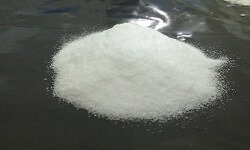IUPAC Name
4-Hydroxy-3-methoxybenzaldehyde
Cas Number
121-33-5
HS Code
2912.41.00
Formula
C8H8O3
Industry
Food Ingredients
Appearance
White Crystalline Powder
Common Names
Vanillin, Methyl Vanillin, Vanillic Aldehyde
Packaging
25 kg drum
Brief Overview
Vanillin is a phenolic aldehyde with the molecular formula of C8H8O3 and consists of functional groups of aldehyde, hydroxyl, and ether. Vanillin is naturally found in species of plants such as Leptotes bicolor and the Chinese red pine. Vanillin was first isolated as a relatively pure substance in 1858 by Nicolas-Theodore Gobley by evaporating a vanilla extract to dryness and recrystallizing the resulting solids from hot water. Vanillin is used in the food industry as a cheap flavoring agent for foods.
Manufacturing Process
The first commercial synthesis of natural vanillin is synthesized from a natural compound called eugenol, found in clove oil and waste Lignin material. Commercial artificial vanillin is prepared from either guaiacol or lignin. It is also prepared naturally from the seed pods of vanilla planifolia. Vanillin is chemically synthesized by which guaiacol reacts with glyoxylic acid by electrophilic aromatic substitution. The resulting vanillylmandelic acid is converted via 4-hydroxy-3-methoxyphenylglyoxylic acid to vanillin by oxidative decarboxylation.
Food Industry
In the food industry, Vanillin is mainly used as a food flavoring agent in food and beverages. It is also widely used as a fragrance ingredient. Vanillin is mainly used in ice creams, chocolates, confectionery, baking, beverages, and fresh dairy products.
Other Application
In the cosmetics industry, vanillin is used in perfumes and the formulation of personal care products. Vanillin is used to formulate home care products, toiletries, and detergent products. Vanillin is used as a feed application in pharmaceuticals, fine chemicals, and agrochemical intermediates. Vanillin is used in visualizing components of a reaction mixture.
